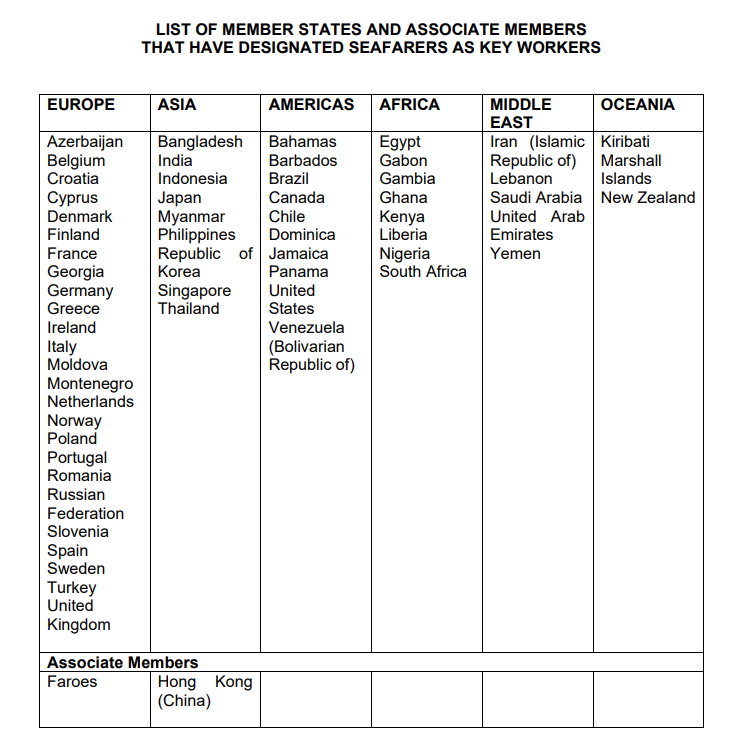June 7, 2021 Maritime Safety News
1. IMO
The below circulars were issued in our COVID-19 report of 21 May and are published here again presenting the latest information to-date from the IMO.
- Addendum no.41 to IMO circular no. 4204 “Coronavirus (COVID-19)” issued on 18 May 2021 relating to the roadmap for vaccination of international seafarers.
-
- Addendum no. 35/rev. 7 issued 20 May 2021 provides a consolidated list of the IMO members that have so far notified IMO on their designation of seafarers as key workers. The list is shown below:
2. IMO Crew Change – National Focal Point for Crew Change and Repatriation of Seafarers
As per our BIMCO news of 12th April, the IMO has discontinued the issue of the IMO circular in series: MSC.7/circ. 1 relating to government states informing the IMO of their national focal point for crew change and repatriation of seafarers. Instead, the IMO’s online Global Integrated Shipping Information System (GISIS) will be used to contain such information.
According to GISIS today, the list of countries (43) informing the IMO of their national focal point of contact for crew change and repatriation of seafarers are: Antigua and Barbuda, Australia, the Bahamas, Bangladesh, Belgium, Brazil, Canada, the Cook Islands, Cyprus, Dominica, Finland, France, Georgia, Germany, Greece, Ghana (new)I, India, Indonesia, Israel, Italy, Jamaica, the Marshall Islands, Mexico, Montenegro, Myanmar, New Zealand, Panama, Peru, the Philippines, Poland, Portugal, Saint Kitts and Nevis, Slovenia, Spain, Sri Lanka, Sweden, Thailand , Tunisia, Turkey, the United Arab Emirates, the United Kingdom and Vanuatu.
Earlier reference of the MSC.7/circ.1 : our implementation page.
3. Government States
Brazil
The state government in Rio Grande do Sul has imposed restrictions to mitigate the continued spread of COVID-19, where – amongst the restrictions – port activities are limited to cargo operations only.
China
Huatai Marine and Oasis P&I have advised on the latest COVID-19 port measures – HuaTai Marine circular dated 28 May and Oasis P&I circular dated 20 May 2021 due to the recent outbreak in India. Members are advised to read these circulars carefully and also check with their local agent at the Chinese port that they are calling to get the latest measures applicable at the time of calling.
France
The French authorities informed IMO ( via an IMO circular letter no. 4234/Add.10) that they have assigned seafarers as priority profession to be included in their vaccination programme.
Norway
According to information provided by the Norwegian Maritime Authority, on-signing seafarers are exempted from hotel quarantine requirements as on 21 May.
Singapore
The Maritime Port Authority of Singapore ( MPA) issued Port maritime circular (PMC) circular no. 21/2021 dated 28 May 2021, advising of the latest requirements for ships arriving in Singapore which will take effect today and supersedes PMC circular no.19/2021. This circular updates the Rostered Routine Testing (RRT) and Antigen Rapid Test ( ART) requirements for shore-based personnel boarding ships at Singapore port.
In addition, the MPA has advised the shipping community on 30 May 2021 ( via email), that in view of the current Phase 2 (Heightened Alert) situation in Singapore, all stakeholders involved in the crew change have to strictly comply at all times, with the Singapore’s safe crew change protocol and requirements. The MPA has the following temporary enhanced requirements/measures for crew change as follows:
- Sign on crew who has served 21 days SHN
i) at the CrewSafe Facility (https://www.ssa.org.sg/mediaimg/publications/sg-star-fund-crewsafe-facilities.html) will be allowed to stay at the designated holding facility in Singapore for not more than 48 hours; and
ii) all other crew will only be allowed to stay at the designated holding facility for not more than 24 hours.
- Sign off crew may stay at the designated holding facility for up to 48 hours.
- Agent and owner shall endeavour for direct transfer from airport to vessel for sign-on crew.
- Agents and appointed drivers are responsible for ensuring that the crew remain in the holding area or private vehicle at all times. At no time should the crew be loitering outside the holding area and interacting with the general public.
4. Others
There is no news issued under this section.
5. BIMCO
BIMCO General COVID-19 Links
BIMCO is continuously monitoring COVID-19 restrictions and its impact on the shipping industry in particular on crew changes. Below are some of the type of information currently being provided by BIMCO :
- Details about implementation measures imposed for sea transport
- Overview of challenges to crew mobility
- Overview of extensions and exceptions to seafarers’ certificates
- COVID-19 seafarers’ mental health
You can also view all information on our COVID-19 landing page.
SOURCE READ THE FULL ARTICLE
https://www.bimco.org/news/ports/20210604-bimco-covid-19-weekly-report






